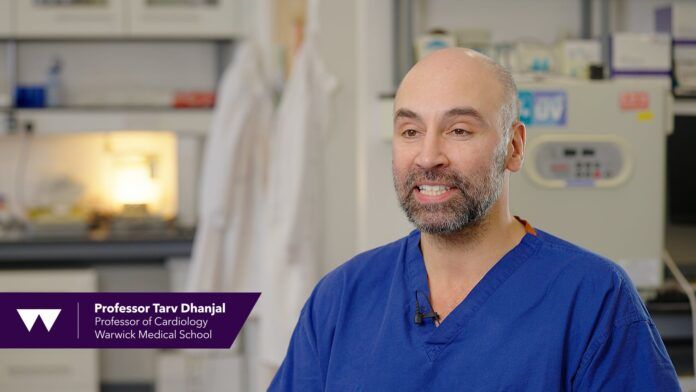Pioneering new treatments and technologies, Professor Dhanjal’s team sets new standards in combating life-threatening heart rhythms
In the vanguard of cardiac rhythm management, Professor Tarv Dhanjal emerges as a distinguished figure, orchestrating a pioneering research program at the University of Warwick and University Hospital Coventry. With heart rhythm disorders posing a grave threat to global health—underscored by the British Heart Foundation’s report that 750 individuals succumb to heart and circulatory diseases each week—Professor Dhanjal’s mission acquires critical urgency. His expertise in Heart Rhythm Research, specifically in the ablation of complex arrhythmias like atrial fibrillation and life-threatening ventricular tachycardia, sets a high benchmark in cardiac care and innovation.
Professor Dhanjal’s academic journey began with first-class honours from Birmingham University Medical School in 2000, followed by a PhD in 2007, underpinned by a British Heart Foundation Research Fellowship. His clinical prowess was further refined at St Thomas’ Hospital, London, where he specialized in heart rhythm treatment. This foundation enabled him to spearhead the Ventricular Tachycardia Research Group at the University of Warwick, focusing on clinical outcomes, new technology appraisal, and basic science/translational research. These endeavours are marked by collaborations with leading universities and industry giants, expanding the frontier of cardiac arrhythmia management.
Embed from Getty ImagesThe research framework Professor Dhanjal leads is multifaceted. Clinical outcomes research has brought the UHCW VT ablation service into international repute, pioneering in understanding and improving electrophysiological outcomes and patient well-being after cardiac interventions. In the arena of new technology appraisal, Professor Dhanjal’s collaboration with Abbott Medical has yielded significant advancements in high-density mapping, as demonstrated in the OMNIMAPPING and IMPACT-VT studies. His role as a national advisor for Abbott Medical and the UK Chief Investigator for the Medtronic DiamondTemp™ Ablation System Registry underscores his influence in shaping the future of cardiac arrhythmia treatment.
Furthermore, Professor Dhanjal’s basic science and translational research, in partnership with esteemed institutions and industry leaders, dives deep into the cellular and molecular underpinnings of heart disease. This research explores the dynamics of myofibroblasts and cardiomyocytes, the effects of DiamondTemp™ ablation, and the mechanisms behind ventricular repolarisation variability, setting new benchmarks in understanding and treating heart rhythm disorders.
Embed from Getty ImagesProfessor Dhanjal and his team at the Institute of Translational Research employ a comprehensive approach, from basic science to clinical trials, to address heart rhythm problems. Their work in developing a ventricular tachycardia workflow, incorporating novel mapping methodologies and cauterization techniques, has markedly improved success rates for catheter ablation, achieving 70 to 90% freedom from fatal heart rhythms over a year.
Professor Tarv Dhanjal and the Ventricular Tachycardia Research Group at the University of Warwick and University Hospital Coventry encapsulate the epitome of medical research and clinical application. Their relentless pursuit of knowledge and innovation not only advances the field of cardiology but also offers new hope to patients grappling with heart rhythm disorders. As they continue to push the boundaries of science and medicine, their work stands as a testament to the transformative power of dedicated research in overcoming some of the most challenging health issues of our time.
